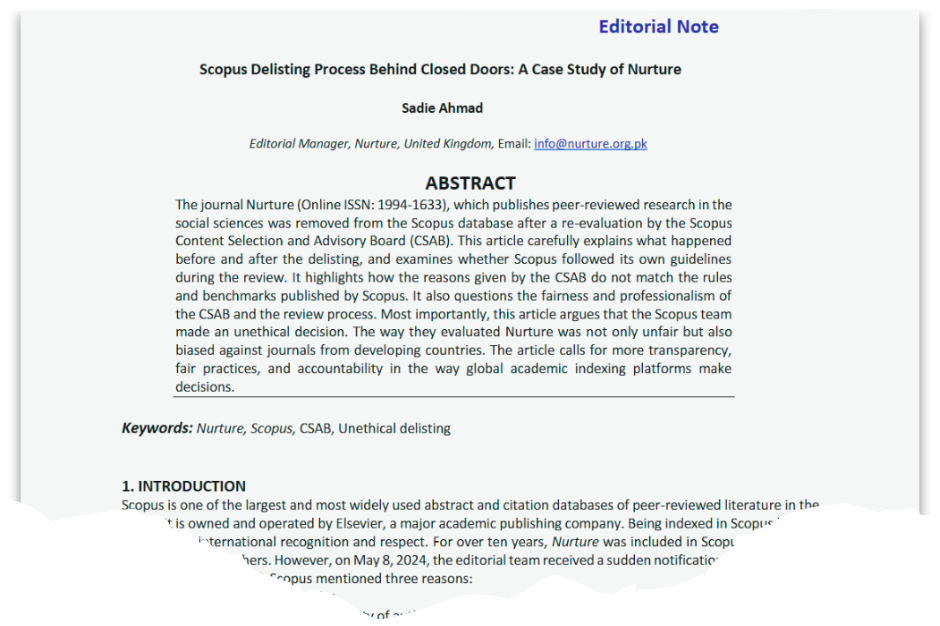A home economics journal delisted from Scopus last year has called the decision “biased against journals from developing countries.”
Elsevier delisted the journal Nurture, published by “Nurture Publishing Group,” from the publisher’s citation database in June 2024, after indexing it for a dozen years. In an editorial published this April, Sadie Ahmad, the editorial manager for Nurture, wrote Scopus delisted the journal for three reasons: an increase in the number of scientific articles published, papers in topics beyond the scope of the journal, and an uptick of authors from different countries.
A representative from Elsevier told us Scopus’ decision was also a result of “weak quality” of papers and “low citation metrics compared to what one would expect of a journal with such history and scope.” The journal has been publishing since 2007.
The journal appealed the decision last July, but was rejected a month later since “the appeal was not warranted and the provided comments did not change the overall judgement and outcome of the review,” the Elsevier spokesperson said.
Ahmad did not respond to our multiple requests for comment. But in the editorial, Ahmad refuted each of the stated reasons for the delisting, and called Elsevier’s rejection of the journal’s appeal “vague and dismissive.”
“The case of Nurture is a warning to the global academic community,” Ahmad wrote. “If we do not demand fairness and accountability from powerful indexing agencies, we risk losing the very principles of equity and diversity that scholarly publishing should uphold.”
Nurture is a self-described “trans-disciplinary” journal formerly published by the Pakistan Home Economics Association. It covers topics “that have direct or indirect relevance to individuals, families, and communities,” according to its website, ranging from family dynamics to economics to textiles. The journal is not indexed in Clarivate’s Web of Science.
The journal’s “Contact Us” page lists its address as 207 Regent Street, London. Some 3,800 companies are registered to that location, which one UK financial news site, This Is Money, called a “scammer’s paradise.” Neither the Pakistan Home Economics Association nor Nurture Publishing Group is listed in the UK’s company registry.
In response to Scopus’ reasons for the delisting, Ahmad wrote the journal published “only 64” papers in 2023, up from 11 the year before. All of those articles “matched the journal’s aims and scope,” Ahmad wrote, attributing the increase to a “new and active editorial board” which “helped bring more submissions.”
The journal’s website currently lists 83 editorial board members from over 20 different countries, although Ahmad wrote some editors “were emotionally disturbed by the language” Scopus used to justify the decision, “and some resigned from their honorary roles.”
The editorial team viewed the increase in author diversity as a “positive change,” according to Ahmad, who noted the board “focused on regional diversity and published articles from several nations.” Elsevier’s website mentions journals are evaluated on diversity.
Another critique Scopus raised, Ahmad wrote, was that “almost all authors” publishing in Nurture “are based in developing countries and/or weak institutions.” And the company noted a large number of Chinese authors based in Thailand, which, according to the editorial, Scopus called “a strange phenomenon.” An Elsevier spokesperson confirmed this language was used in the review comments for the journal.
Ahmad called the pattern a “global trend” and argued “such a comment reflects prejudice, not a sound academic evaluation.”
“The use of terms like ‘weak institutions’ and pointing out authors from ‘China’ and ‘Russia’ shows unethical and biased behavior,” Ahmad wrote.
A representative from Elsevier told us the decision to delist the journal was “not because there are authors from developing countries, however, the geographical diversity for this journal is limited for what one would expect for such journal [sic].”
Ahmad wrote that Scopus told the journal it had “gone astray” and the citations “reflect this,” noting only one of its 190 papers had more than 11 citations. (Scopus itself shows 162 indexed papers for Nurture, with four that have over 11 citations.)
“I have never discovered a standard for per-article citations,” Ahmad wrote, citing Scopus’ content policy and selection page that lists three “benchmarks” indexed journals must meet. These include self-citation rate, total citation rate, and CiteScore metrics, a measurement developed by Elsevier akin to Clarivate’s impact factor metric.
Among Ahmad’s complaints was confusion about who is responsible for Scopus’ decision. Ahmad wrote Scopus “claimed to follow advice” from its advisory board but “can also make changes without prior notice.”
According to the content policy page, Elsevier “follows the independent advice” from its Content Selection and Advisory Board of subject experts, but Scopus is still responsible for final decisions.
Like Retraction Watch? You can make a tax-deductible contribution to support our work, follow us on X or Bluesky, like us on Facebook, follow us on LinkedIn, add us to your RSS reader, or subscribe to our daily digest. If you find a retraction that’s not in our database, you can let us know here. For comments or feedback, email us at [email protected].

The Nature vs Nurture jokes write themselves…
I find it interesting that a small, fairly low impact journal from Pakistan managed to be flagged for suspicious publishing behaviour when I see many journals from Western publishers exhibit similar patterns as those described here continuing to operate unmarred. How is increasing publications from 11 to 64 more suspicious than an Elsevier journal jumping from 500 to 8000 papers published? Maybe the rapid rise in impact factor that counter-intuitively accompanied the increase is enough to throw them off the scent? That or the $24M in annual revenue that journal now brings in from APCs.
If you’re claiming to be cleaning up the literature, at least be consistent about it.
I agree that Elsevier publishes many journals of very low quality. Those journals are still indexed in Scopus.